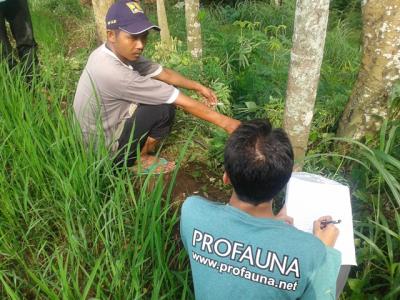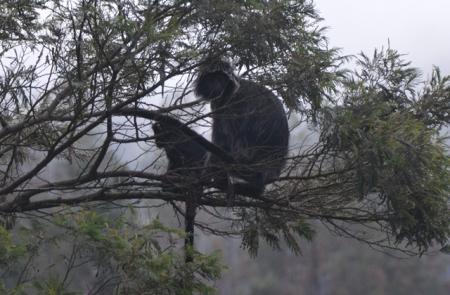Most Residents Around Yang Highlands Wildlife Reserve are not Aware of Javan Langur's Protection Status
Conflicts between human and wild animals in Indonesia has been spiking recently, particularly in areas close to the animals' ever-shrinking natural habitats. The scarcity of food in the natural habitat has forced the animals to enter neighborhoods or plantations to look for food. This leads to conflicts as people feel threatened by wild animals, and regard them as pests.
In Java, human-animal conflicts often occur in villages around conseravtion areas which has been converted into plantations or neighborhoods such as in Taman Kursi and Baderan village in Situbondo which is adjacent to Yang Highlands Wildlife Reserve. The local farmers are having a hard time protecting their plants from macaques and langurs.
"The monkeys often come into my house and steal foods. They also damage the crops in my corn field," said Suci, a farmer living in Baderan village.
In March 2016, a team from Protection of Forest & Fauna (PROFAUNA) Indonesia conducted a survey concerning human-animals conflicts, which involved 30 farmers. The respondents are residents of Taman Kursi and Baderan villages which had had conflicts with the Long-tailed Macaque (Macaca fascicularis) and the Javan Langur (Trachypithecus auratus).
 The survey was done through a series of interviews, where the local farmers were given questions about macaques and langurs. 27 of them (90%) are aware of the presence of macaques and langurs, and 20 of them (74%) know the difference between the two species. They mentioned that the difference lies in their body fur; langurs' fur is darker than the greyish macaques.
The survey was done through a series of interviews, where the local farmers were given questions about macaques and langurs. 27 of them (90%) are aware of the presence of macaques and langurs, and 20 of them (74%) know the difference between the two species. They mentioned that the difference lies in their body fur; langurs' fur is darker than the greyish macaques.
All respondents (100%) agreed that monkeys are disturbance. 25 of them (83%) said that the macaques damaged their crops, such as rice, corn, banana, and tobacco. The rest said that macaques often break in to their houses by opening the roof and steal their foods.
What about the Javan Langur? Only seven respondents (23%) actually do not consider this primate species as disturbance, while the other 23 (77%) feel that Langurs disturb them as much as the macaques do although in a less severe degree.
Despite all the problems caused by the macaques and langurs, people in both villages never tried to kill or catch the wild animals, and they prefer to drive the monkeys off of their farms and houses. Fourteen people (47%) said that they chased away the monkeys by yelling at the groups, 4 of them (13%) use catapult, and 4 others (13%) use stones and firecrackers.
In addition to driving the wild monkeys off of the farms, three respondents (10%) said that they also installed fences and nets to protect the crops. Four people prefer guarding their own farms in person.
During the interview, PROFAUNA's team also informed the local people about the Javan Langur, particularly about its protection status which makes it strongly prohibited to kill or catch them. Giving informal education for local people is one of PROFAUNA's priority to improve their awareness towards the protection status of the Javan Langur. The survey revealed that only 5 people out of 30 (17%) understand that the Javan Langur is protected by law. The rest are as unaware as the other people who live around Yang Highlands.
The survey result shows that the local people's awareness towards the protection of the Javan langur is very low. This means that PROFAUNA still have a lot to work on, including giving education and campaign to promote Javan Langur protection in villages around Yang Highlands Wildlife Reserve.

